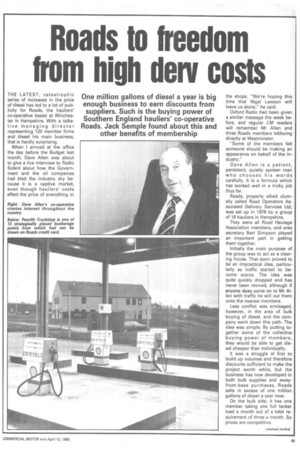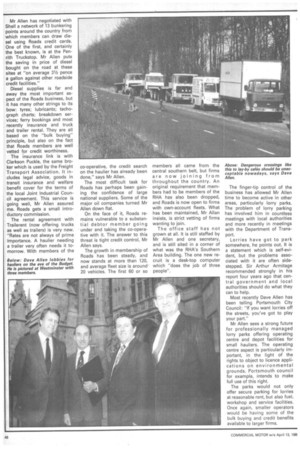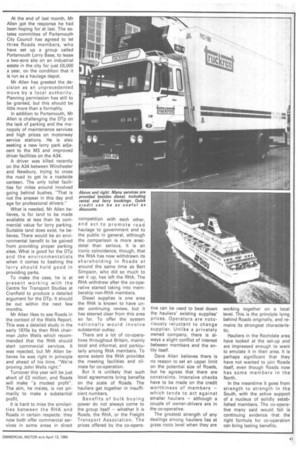Roads to freedom from high dery costs
Page 47

Page 48

Page 49

If you've noticed an error in this article please click here to report it so we can fix it.
One million gallons of diesel a year is big enough business to earn discounts from suppliers. Such is the buying power of Southern England hauliers' co-operative Roads. Jack Semple found about this and other benefits of membership
THE LATEST, catastrophic series of increases in the price of diesel has led to a lot of publicity for Roads, the hauliers' co-operative based at Winchester in Hampshire. With a talkative managing director representing 120 member firms and diesel his main business, that is hardly surprising.
When I arrived at the office the day before the Budget last month, Dave Allen was about to give a live interview to Radio Solent about how the Government and the oil companies had bled the industry dry because it is a captive market, even though hauliers' costs affect the price of everything in the shops. "We're hoping this time that Nigel Lawson will leave us alone," he said.
Oxford Radio had been given a similar message the week before, and regular CM readers will remember Mr Allen and three Roads members lobbying directly at Westminster.
"Some of the members felt someone should be making an appearance on behalf of the industry."
Dave Allen is a patient, persistent, quietly spoken man who chooses his words carefully. It is a formula which has worked well in a tricky job thus far.
Roads, properly albeit clumsily called Road Operators Associated Delivery Services Ltd, was set up in 1978 by a group of 16 hauliers in Hampshire.
They were all Road Haulage Association members, and area secretary Bert Simpson played an important part in getting them together.
Initially the main purpose of the group was to act as a clearing house. That soon proved to be an impractical idea, particularly as traffic started to become scarce. The idea was quite quickly dropped and has never been revived, although if anyone does come on to Mr Allen with traffic he will out them onto the nearest members.
Less conflict was envisaged, however, in the area of bulk buying of diesel, and the company went down this path. The idea was simple. By putting together some of the collective buying power of members, they would be able to get diesel cheaper than individually.
It was a struggle at first to build up volumes and therefore discounts sufficient to make the project worth while, but the business has now developed in both bulk supplies and awayfrom-base purchases. Roads sells in excess of one million gallons of diesel a year now.
On the bulk side, it has one member taking one full tanker load a month out of a total requirement of three a month. So prices are competitive. Mr Allen has negotiated with Shell a network of 13 bunkering points around the country from which members can draw diesel using Roads credit cards. One of the first, and certainly the best known, is at the Penrith Truckstop. Mr Allen puts the saving in price of diesel bought on the road at these sites at "on average 31/2 pence a gallon against other roadside credit facilities."
Diesel supplies is far and away the most important aspect of the Roads business, but it has many other strings to its bow: tyres; lubricants; tachograph charts; breakdown services; ferry bookings and most recently insurance and truck and trailer rental. They are all based on the "bulk buying" principle, but also on the fact that Roads members are well vetted for credit worthiness.
The insurance link is with Clarkson Puckle, the same broker which is used by the Freight Transport Association. It includes legal advice, goods in transit insurance and welfare benefit cover for the terms of the local Joint Industrial Council agreement. This service is going well, Mr Allen assured me. Roads gets a small introductory commission.
The rental agreement with Trailerent (now offering trucks as well as trailers) is very new. "Rates are not always of prime importance. A haulier needing a trailer very often needs it tomorrow. With members of the co-operative, the credit search on the haulier has already been done," says Mr Allen.
The most difficult task for Roads has perhaps been gaining the confidence of large national suppliers. Some of the major oil companies turned Mr Allen down flat.
On the face of it, Roads remains vulnerable to a substantial debtor member going under and taking the co-operative with it. The answer to this threat is tight credit control, Mr Allen says.
The growth in membership of Roads has been steady, and now stands at more than 120, and average fleet size is around• 20 vehicles. The first 60 or so members all came from the central southern belt, but firms are now joining from throughout the country. An original requirement that members had to be members of the RHA has also been dropped, and Roads is now open to firms with own-account fleets. What has been maintained, Mr Allan insists, is strict vetting of firms wanting to join.
The office staff has not grown at all. It is still staffed by Mr Allen and one secretary, and is still sited in a corner of what was the RHA's Southern Area building. The one new recruit is a desk-top computer which "does the job of three people" The finger-tip control of the business has allowed Mr Allen time to become active in other areas, particularly lorry parks. The problem of lorry parking has involved him in countless meetings with local authorities and more recently in meetings with the Department of Transport.
Lorries have got to park somewhere, he points out. It is a statement which is self-evident, but the problems associated with it are often sidestepped. Sir Arthur Armitage recommended strongly in his report four years ago that central government and local authorities should do what they can to help.
Most recently Dave Allen has been telling Portsmouth City Council: "If you want lorries off the streets, you've got to play your part."
Mr Allen sees a strong future for professionally managed lorry parks offering operating centre and depot facilities for small hauliers. The operating centre aspect is particularly important, in the light of the rights to object to licence applications on environmental grounds. Portsmouth council for example, intends to make full use of this right.
The parks would not only offer secure parking for lorries at reasonable rent, but also fuel, workshop and service facilities. Once again, smaller operators would be having some of the bulk buying and credit benefits available to larger firms. At the end of last month, Mr Allen got the response he had been hoping for at last. The estates committee of Portsmouth City Council has agreed to let three Roads members, who have set up a group called Portsmouth Lorry Base, to lease a two-acre site on an industrial estate in the city for just £6,000 a year, on the condition that it is run as a haulage depot.
Mr Allen has greeted the decision as an unprecedented move by a local authority. Planning permission has still to be granted, but this should be little more than a formality.
In addition to Portsmouth, Mr Allen is challenging the DTp on the lack of parking and the monopoly of maintenance services and high prices on motorway service stations. He is also seeking a new lorry park adjacent to the M3 and improved driver facilities on the A34.
A driver was killed recently on the A34 between Winchester and Newbury, trying to cross the road to get to a roadside canteen. The only toilet facilities for miles around involved going behind bushes. "That is not the answer in this day and age for professional drivers."
What is needed, Mr Allen be lieves, is for land to be made available at less than its commercial value for lorry parking. Suitable land does exist, he believes. There would be an environmental benefit to be gained from providing proper parking sites. What is good for the DTp and the environmentalists when it comes to bashing the lorry should hold good in providing parks.
To make the case, he is at present working with the Centre for Transport Studies at Cranfield to produce a detailed argument for the DTp. It should be out within the next few months.
Mr Allen likes to see Roads in the context of the Wells Report.
This was a detailed study in the early 1970s by then RHA chairman John Wells which recommended that the RHA should start commercial services. It was rejected, but Mr Allen believes he was right in principle and ahead of his time. "We're proving John Wells right."
Turnover this year will be just short of £2 million, and Roads will make "a modest profit". The aim, he insists, is not primarily to make a substantial profit.
It is hard to miss the similarities between the RHA and Roads in certain respects: they now both offer commercial services in some areas in direct competition with each other, and act to promote road haulage to government and to the public in general, although the comparison is more anecdotal than serious. It is an ironic coincidence, though, that the RHA has now withdrawn its shareholding in Roads at around the same time as Bert Simpson, who did so much to set it up, has left the RHA. The RHA withdrew after the co-operative started taking into membership non-RHA members.
Diesel supplies is one area the RHA is known to have under continuing review, but it has steered clear from this area so far. To offer the system nationally would involve substantial outlay.
There are a lot of co-operatives throughout Britain, mainly local and informal, and particularly among RHA members. To some extent the RHA provides the meeting facilities and climate for co-operation.
But it is unlikely that such local agreements bring benefits on the scale of Roads. The hauliers get together in insufficient numbers.
Benefits of bulk buying power do not always come to the group itself — whether it is Roads, the RHA, or the Freight Transport Association. The prices offered by the co-opera tive can be used to beat down the hauliers' existing supplies' prices. Operators are notoriously reluctant to change supplier. Unlike a privately owned company, there is always a slight conflict of interest between members and the entity itself.
Dave Allen believes there is no reason to set an upper limit on the potential size of Roads, but he agrees that there are constraints. Intensive checks have to be made on the credit worthiness of members — which tends to act against smaller hauliers — although a couple of owner-drivers are in the co-operative.
The greatest strength of any dealings among hauliers lies at grass roots level when they are working together on a local level. This is the principle lying behind Roads originally, and remains its strongest characteristic.
Hauliers in the Rochdale area have looked at the set-up and are impressed enough to want to emulate it in their area. It is perhaps significant that they have not wanted to join Roads itself, even though Roads now has some members in the North.
In the meantime it goes from strength to strength in the South, with the active support of a nucleus of solidly established members. The co-operative many said would fail is continuing evidence that the right formula for co-operation can bring lasting benefits.




















































































